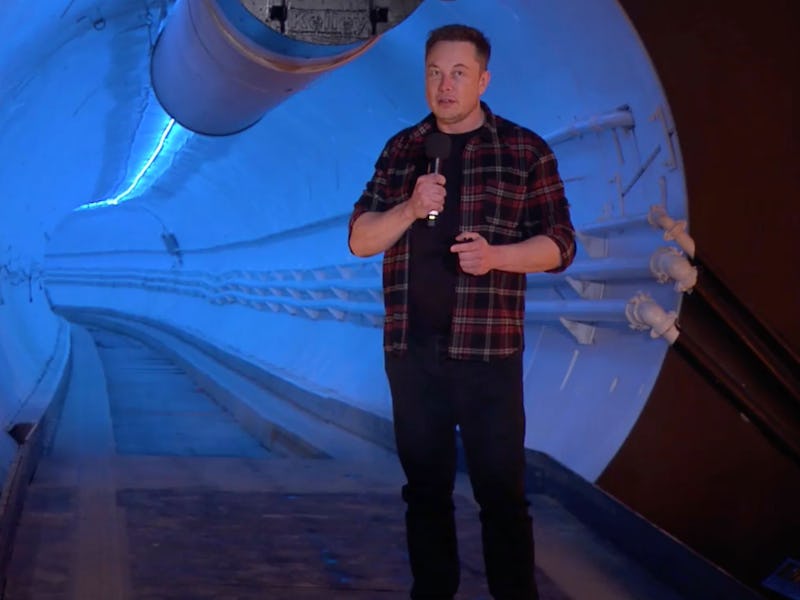One fake Elon Musk tweet shows The Boring Company's big problem
Musk's tunnel-digging venture may be digging itself into a hole.

Elon Musk’s tunnel-digging firm does not have the best public image.
The Boring Company was founded at the start of 2017 to reduce city traffic and tunneling costs. But Musk’s now-deleted mocking of “subway Stalinists,” grand claims about ending induced demand, and shifting visions of the final tunnel (originally set to feature custom passenger pods and skates, now essentially a tunnel for autonomous electric cars like Teslas) have obscured the company’s potential real-world benefits like 10-fold cheaper tunnel construction.
This was perhaps best exemplified this week by author Dan Lyons, who shared a fake announcement on Twitter by Musk this week:
To combat urban sprawl, Elon Musk proposes cities should build tall narrow “space towers” 50+ stories high. Each space tower could house thousands of people. “I mean it’s just obvious,” he says.
Each floor of Space Tower (tm) would contain 4 dwellings, or Space Pods (tm), each large enough for a family. With kitchen, bathroom, living and sleeping space. Entire outer structure of building is photovoltaic. Interior structure & walls contain several billion batteries.
Dan Lyons' Twitter post.
The tweets echo several of Musk’s assertions around The Boring Company, like the idea that cities could avoid induced demand traffic problems by digging up to 30 layers of tunnels. It also echoes a previous criticism of the firm, that it essentially reinvented the subway. Lyons’ tweet attracted a number of exhausted responses from followers. Musk, they assumed, was once again solving major urban planning issues by ignoring the existing work in the space.
The responses to Lyons' tweet.
“I thought was a pretty obvious joke,” Lyons tells Inverse. “That said, I would gladly put down a $5,000 deposit to get one of the first SpacePods (tm) in Musk Tower 1.”
The tweet came after a series of posts from Musk where he dismissed the well-established theory of induced demand as “one of the most irrational theories I’ve ever heard.”
“Elon Musk Dismisses Induced Demand, A Phenomenon First Witnessed In 1866,” a headline from Forbes read in response to Musk’s comments. Induced demand suggests that building more roads will cause more people to use the roads. The article cites the 28-lane Katy Freeway in Houston, where the city spent $2.8 billion over three years until 2011 adding more capacity. Travel times on the expanded freeway increased by 55 percent during evening commutes.
Part of Musk’s argument against induced demand, outlined in December 2018, is that The Boring Company could build enough tunnels in Los Angeles to theoretically move the entire United States at once. The city would be unlikely to ever need that much capacity.
But it’s not the first time Musk’s views on urban planning have been criticized. In December 2017, after Musk described public transport as “a pain in the ass,” public transit policy consultant Jarrett Walker declared that “letting [Musk] design cities is the essence of elite projection.” Musk shot back that Walker was a “sanctimonious idiot.”
At times, Musk has indicated that The Boring Company could support traditional public transport like subways. On December 29, he declared that people could “put trains in [tunnels] or cars or whatever,” but the important message was to build more tunnels.
It’s here where The Boring Company could offer the biggest real-world benefits. Its 1.14-mile test tunnel in Hawthorne, California was built at a cost of $10 million. Traditional projects could cost up to $1 billion per mile. Musk stated in May 2018 the company’s goal was to beat the snail, which tunnels faster than a traditional boring machine. Advancements in boring techniques, like continuously-running machines, could help reduce costs. The first real-world test of its technologies will be the Las Vegas loop, set to be ready for CES in January 2021.
But with Musk mired in debates over whether subways are good and induced demand is real, The Boring Company’s tunnel-digging work looks set to be obscured.